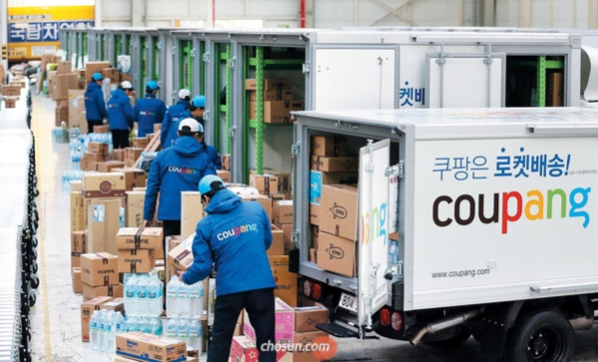Input 2021.01.08 15:00
Estimated sales exceeded 10 trillion won last year due to Corona… “The turnaround will be faster”
Some speculation that the deficit would have exceeded 1 trillion… As if the deficit would increase to 4 trillion won
Capital encroachment crisis without additional external investment
Japan’s Softbank, led by Chairman Son Jeong-eui (Japanese name Son Masayoshi), announced that it will list Coupang, a domestic online e-commerce company, on the NASDAQ within this year, and attention is focused on the success.
It seems that it was judged that it was easier for Coupang to attract investment funds as the distribution industry changed the game due to the coronavirus infection (Corona 19). However, there are skepticism about Coupang’s IPO, which is estimated to have had a cumulative deficit of about 4.5 trillion won by last year.

Experts believe that in order for Coupang to be listed successfully, three factors of concern must be overcome.
① Can the deficit of 4.5 trillion accumulated over 6 years and turn into a surplus?
The biggest concern for the industry is Coupang’s deficit. Coupang has never made a surplus since 2014. The accumulated deficit until 2019 is 3.7 trillion won. If we add to the estimated deficit last year (about 600 billion to 1 trillion won), the estimated cumulative deficit will increase to around 4.5 trillion won.
Three securities firms (Mirae Asset Daewoo, Samsung, and Hana Financial) estimate that Coupang posted an operating deficit of about 530 to 660 billion won last year. On the other hand, some in the industry speculate that Coupang would have lost more than 1 trillion won last year.
This is due to the cost incurred in the process of rapidly getting bigger. It is an analysis that sales and management costs such as labor costs, logistics, delivery, and commissions will have increased. In addition, Coupang maintains a lower selling price compared to the purchase cost to secure customers. Alberto Ponaro Coupang’s Chief Financial Officer (CFO) said in an in-house email in August of last year that “we will pay 500 billion won worth of corona-related expenses per year.”
② Coupang, which fell lively, is in crisis of capital erosion

The cash held by Coupang is about 990 billion won (including cash and financial assets) as of the end of 2019. The retained earnings are negative (-) 3,7590 billion won. If a deficit of more than 1 trillion won was made last year while there has already been a loss, it may be necessary to touch the foundation of the business (paid capital). This means that it is a crisis of capital erosion that is forgotten to the bottom. To resolve this, shareholders must make a free reduction or capital investment to reduce the number of shares without compensation.
Han Tae-il, a senior researcher at Korea Credit Rating, said, “In 2019, Coupang’s profit structure and strategy are clear, so if we do not change the direction, we believe that the holdings will be exhausted within a year or two.” I would have done it, and it seems that I have physical strength to endure the deficit.”
③ WeWork, which invested 10 trillion won, failed to list.

However, Chairman Son Jeong-eui was confronted with a failure to list WeWork, a shared office company that invested 10 trillion won in 2019. The failure of WeWork’s listing raised doubts about the viability of Softbank’s investment model, which has relied on the public offering of deficit companies. Softbank’s Vision Fund No. 1 and 2 (total of $208 billion) account for 26% of the world’s venture capital operating assets (estimated $803 billion). However, companies that have invested large amounts of money so far have plunged after listing, or collapsed before listing, like WeWork.
Josh Enomoto, a former senior business strategist at Sony, said in a contributing to Investorplace, a US financial magazine, “Korea has a high population density, so delivery is easy, but there is a high possibility that delivery takes a long time due to traffic congestion.” “It is a risk factor that investors are highly likely to take a closer look at Coupang’s profitability as SoftBank Group is evaluated as having failed to invest in WeWork in the past,” he said.
